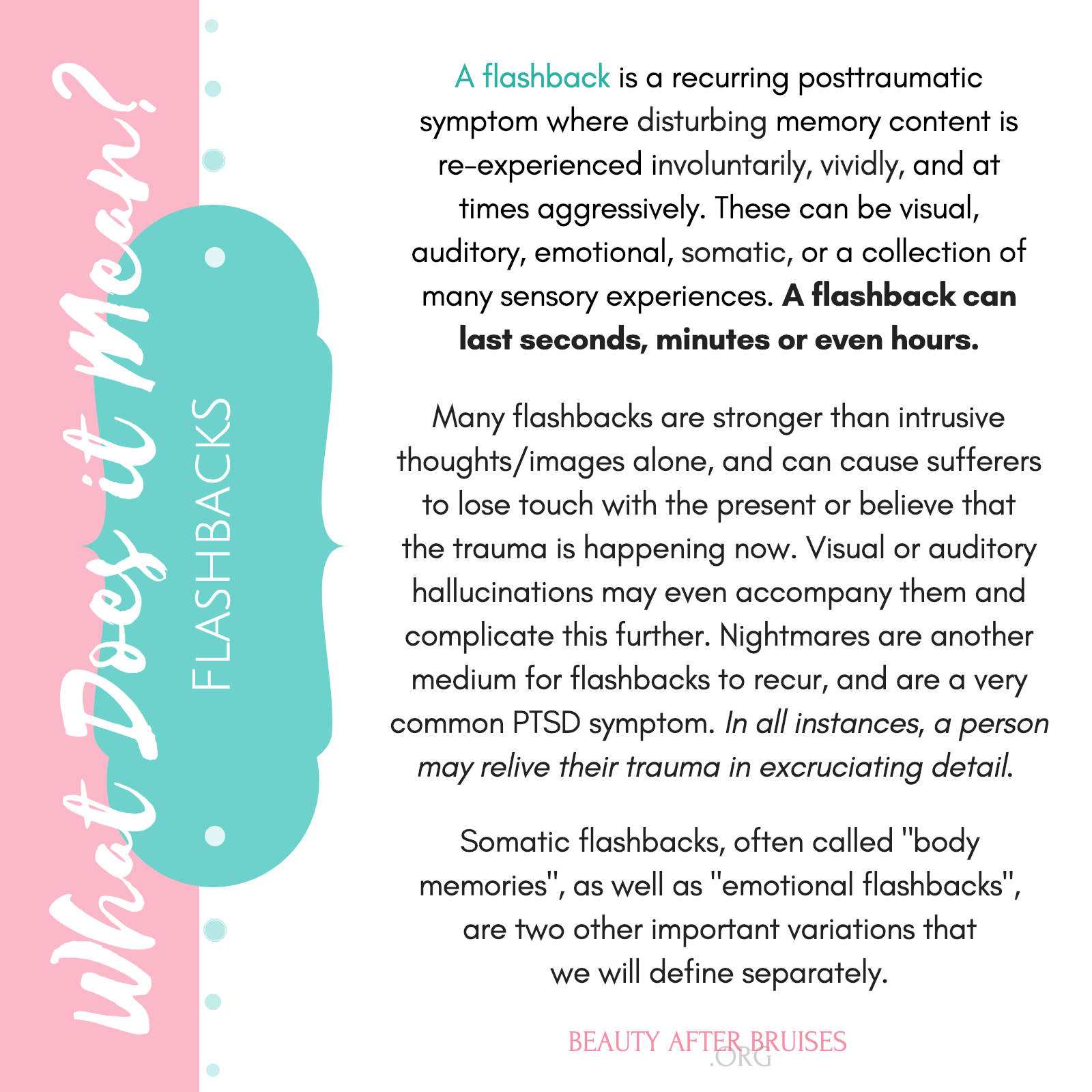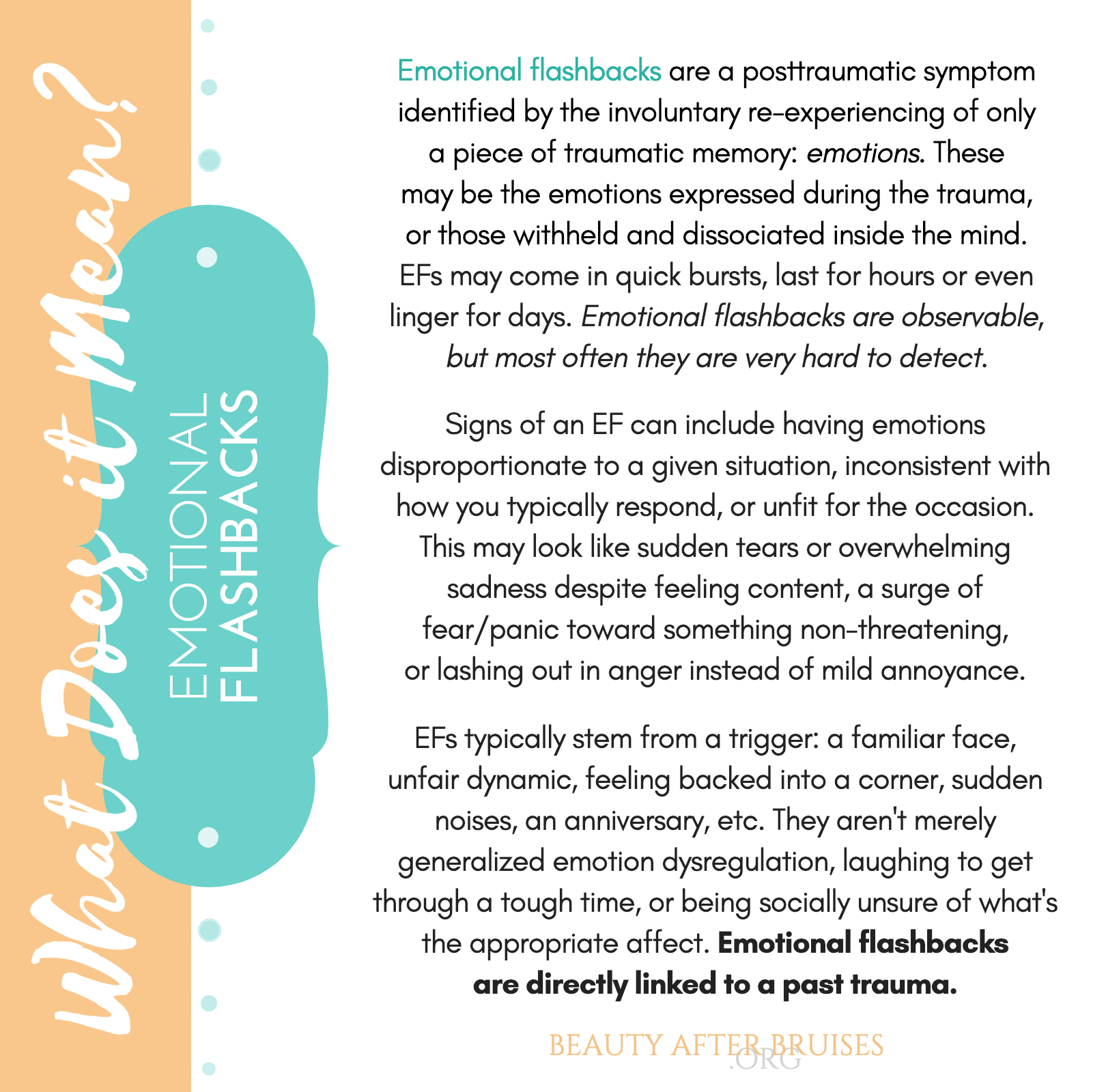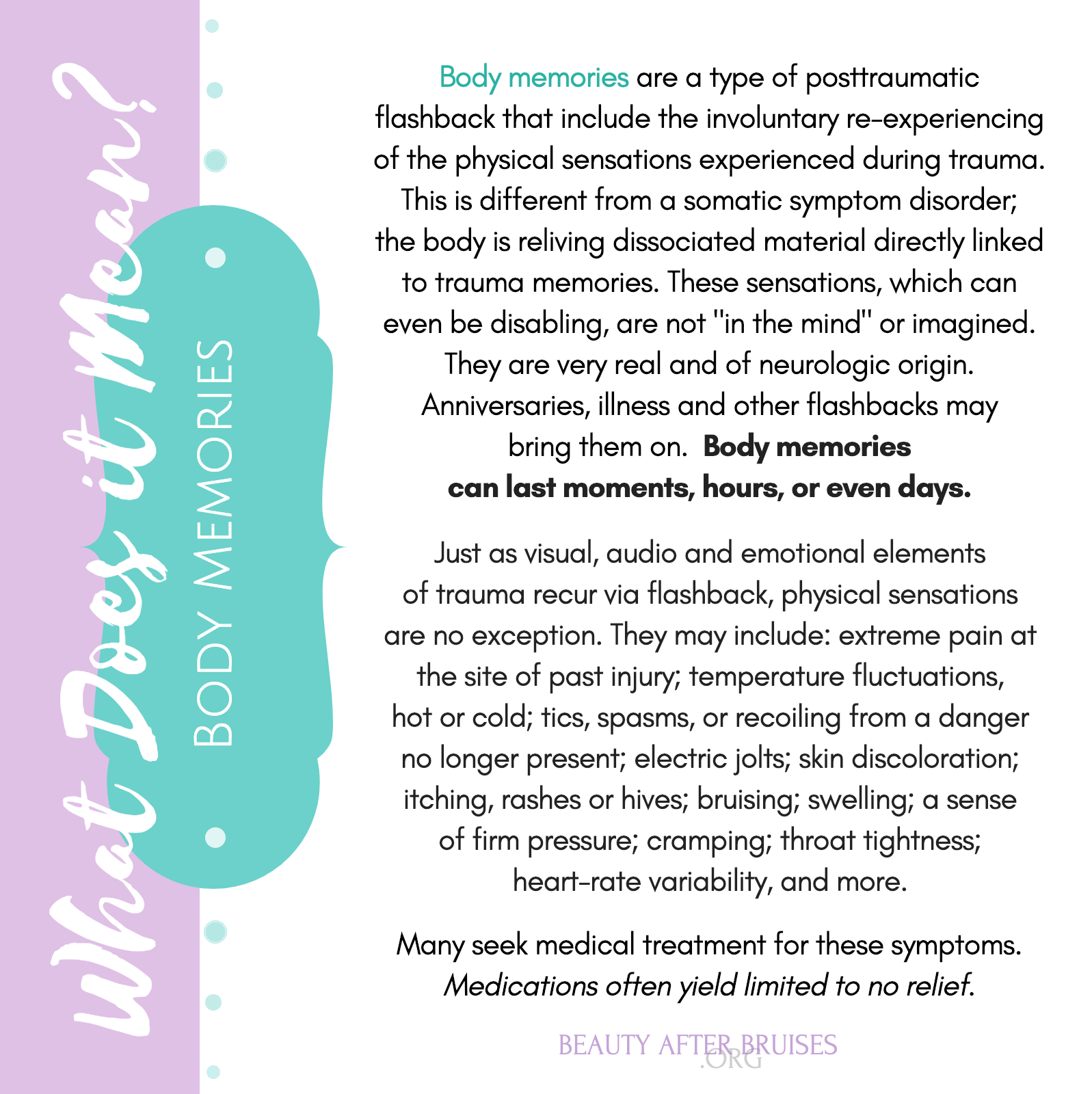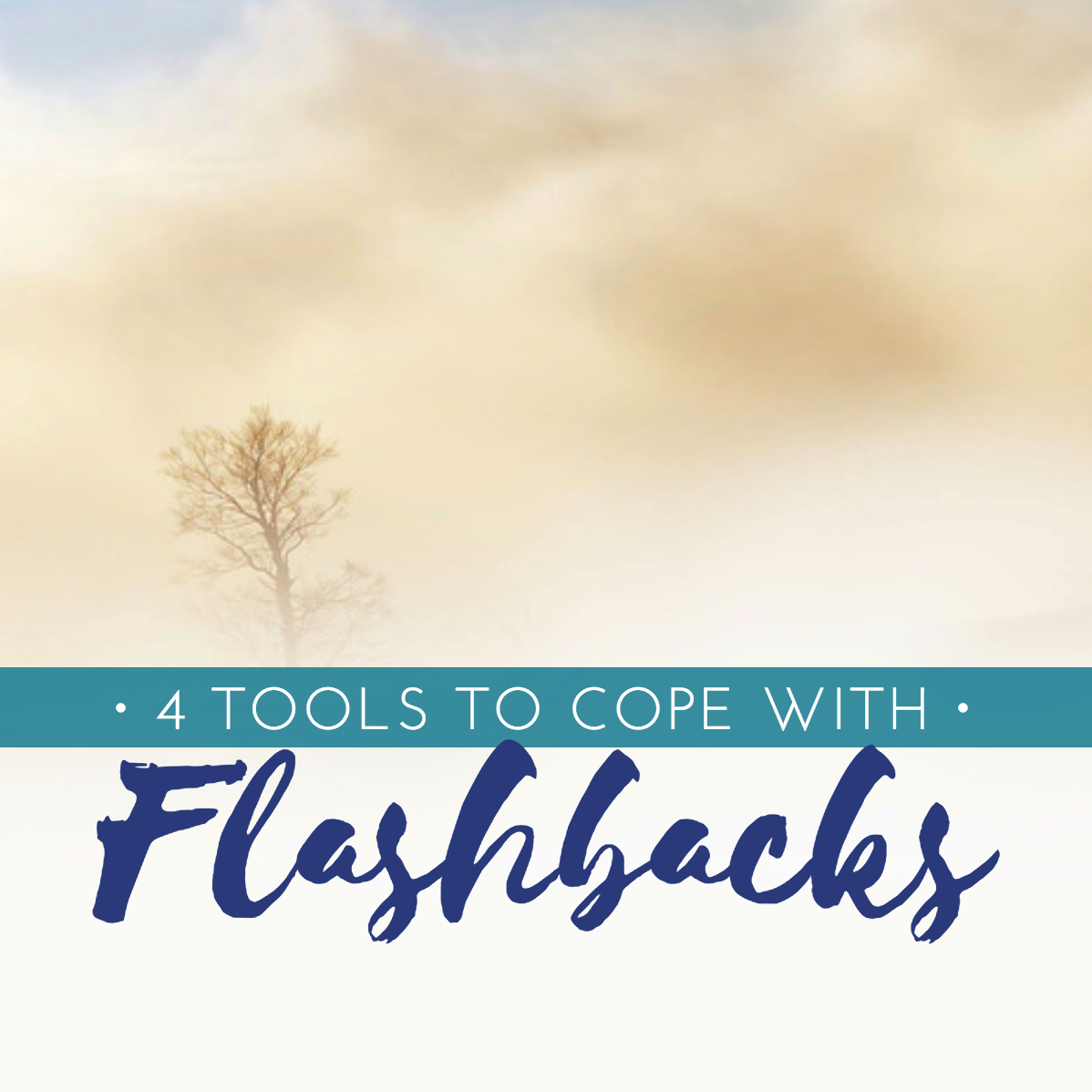There is no delicate way to put it: flashbacks are just awful. Whether you've just started experiencing these upsetting and intrusive symptoms, or you've been fighting them for years, we know how challenging and exhaustive they can be! Thankfully, a wide variety of tools and skills exist to help you break free—each one highly customizable to your specific needs. That said, some of the very best options out there can take some time, and a lot of practice, before you've shaped them into that go-to symptom management tool you can pull on any time. Skills like imagery, containment, split-screen, and a few modulation tools are all incredibly valuable, but they can be quite advanced, and sometimes even turn survivors away from them altogether if introduced too soon. For those new in their healing, options that are very straightforward and uncomplicated can be their greatest lifeline. For those with a full workshop of tools, we know how possible it is for giant waves of new or stubborn trauma material to put even your best skills out of reach. So, items that are extremely easy to recall in a time of panic or crisis, as well as very rudimentary to enact, may be the only efficient tools at your disposal. We hope to be able to offer survivors in all stages of recovery that perfect flashback kit.
Before we get too far, let's first define what a flashback is! Whether you're a trauma survivor yourself, or a loved one/supporter of one who’s trying to learn more, you may be surprised to learn there are different types of flashbacks:



So, what can you do?
We recognize that half the battle when you're struggling is being able to just remember that these tools even exist and are available to you. When you're terrified, feeling very young, or you aren't oriented to the present, it can be really hard to even recognize that you're symptomatic. Try to be compassionate with yourself (or your friend, family member, or client) about this. Years upon years, sometimes decades, were spent responding to distress/trauma in the same exact way; it is very hard to retrain the brain to respond differently when you're only presented an opportunity to try every so often. Also, flashbacks stem from a completely different section of our daily-functioning brain. It takes hard work to override that circuitry, and none of us think very logically or critically when we’re flooded with fear and adrenaline. But, with practice, and utilizing these skills as early in your symptoms as you can, you'll find they become more habitual and automatic - taking less conscious effort and acting more like muscle memory.
Let's get to it!
Grounding
Your absolute number one, first line of defense for any posttraumatic symptom is to get grounded—or at least substantially more grounded than you are in that moment. None of your other skills will be as effective if you aren't oriented to the present day, body, and sense of self first. (You can learn more about what it means to be grounded, as well as have an entire list of 101 Grounding Techniques at your fingertips, right here on our website!) We do know it can sometimes feel impossible to practice grounding before you've put a memory away, especially if that memory is what's fueling your dissociation and making you ungrounded. But, if you're heavily dissociated, and stuck in the past, you're only putting the memory away in the past - not in the here and now. It will continue to find you in this timeline. As you start the grounding process, you'll find that some of the intensity of the trauma material backs down, freeing you up to use other skills you may have (i.e. containment or modulation). This takes things down another notch, allowing you to get even more grounded, and so on. A positive loop.
What are some of the best, most-easily accessible grounding tools?:
Open your eyes. Uncover your ears. Make as many senses available as you can!
Look around. Try to label 5 things you can see, 5 things of a single color, 5 things of one shape.
Listen. What do you hear? Is it close or far? Loud or soft? Pleasant or grating?
Open up, feet on the floor. If you're curled into a ball, or have your feet tucked up on the chair, try to put them on the floor and press your feet firmly into the ground. Become rooted to the space you’re in (no longer lifted or untethered from everything, just like your currently dissociative mind). And, especially free yourself of those more childlike, fear-based positions that continue to alert to your brain that you’re in danger. We know they feel self-soothing, but they’re cuing the exact opposite message to your mind in the middle of this symptom. You may be able to return to it later after you’ve gotten confidently in control of these memories.
De-trance. If you are rocking, tapping, swaying a limb, clicking, or engaging in any other rhythmic, trancing motion, try to start slowing it to a pause or make sure it’s at least no longer a pattern. Some of these actions may be part of something sensorily grounding for you, or a positive stim; if that's the case, just try to diversify its monotonous, predictable traits that can lull us deeper into those trancey spaces.
Sit upright. If you are slouching deep in your seat or laying down on your bed, try to slowly sit up - vertebrae by vertebrae. Lying prone can be very disorienting and triggering for many.
Orient. Remind yourself of the date, your age, where you are, and that you're safe now.
Movement. If you feel frozen and unable to move, start by just trying to wiggle your toes or finger tips. Slowly work up the body, little by little, until you regain function and control of your body. This may take awhile if you’re particularly locked in. That’s okay, just go at your body’s safe pace. In your time, control, and say so.
Smell. Inhale strong fragrances (they don't have to be pleasant!). Coffee, candles, lemon, lotions, the kitty litter, it doesn’t matter! Just awaken yourself to what’s before you.
Taste. Chew gum, eat mints, or suck on sours. Eat a meal or snack. Drink a very cold or warm beverage.
Touch. Run your fingers over unique textures within reach. Your clothes, the furniture, a zipper, a pet, a grounding stone, or fidget item.
There are many, many other grounding tools, as well as a more detailed explanation as to why and how they are helpful, in our aforementioned article, so we'll move on to our next step to not be redundant! It has the best hacks anyway ;) Our seasoned pros will have heard all these surface-level ones a million times!
Self-Talk
Our inner monologue is far more important and powerful than we tend to give it credit. Self-talk during a flashback can be part of your grounding or be used to keep you calm and steady while you employ other techniques. It can be hard to access your grounding skills (or other tools) if you’re in a panic and can't remember what's even happening to you or who you are. Self-talk can be a vital skill that allows everything else to fall into line.
You can say things to yourself like:
"This is a flashback. It is just a flashback; it is not real. This is not happening right now."
"I am safe now. No one is presently harming me. There is no external threat to my safety in this moment."
"I am an adult now. My name is ______. I am ____ years old. It is 20__."
"This will not last forever. I have the power to make this symptom go away."
"I am competent. I am able. I have done this before."
"It's important that I get grounded. Dissociating can feel safer, but I've learned it puts me and others at risk. I can do this."
"I can ask for help. I am worthy, even if that's hard to believe right now."
"This is temporary. I can feel it getting easier already. I will be okay."
“I am in control. I get to decide when and how this leaves. I have the power now.”
Find a mantra or phrase that feels right to you, something you know you'll remember when it's time. Talk yourself through the process. It is healthy, helps keep you planted in reality, and reminds you of the power you have now that you didn’t before.
Separating Past from Present
Separating past from present can work on many levels as a combination of self-talk, grounding and reality-testing. It's also a tool outsiders or loved ones can help you with, too! No longer all up to you! During a flashback, it's very easy to be disoriented from the current time or place. You could feel like you're all the way back in the 80's, believe you're a small child, or just in a completely different environment than you truly are. Taking the time to label all the things that are different now from the past you're reliving can help your mind tease apart the complete lack of safety you feel from the true security of your present environment. You can do so in your mind, out loud, in writing, or some other creative way that feels right to you.
Some examples:
"It is 20__, not [date/timeframe of the flashback]"
*look at body* "These are adult hands and feet. I am taller now." Observe other physical changes like tattoos, body modifications, health changes, wrinkles or grey hairs.
"There were no smartphones back then. TVs didn't look like this. I didn't have a laptop or desktop computer like this." Notice other anachronisms and things that couldn’t have existed at the time of the memory.
"I live on my own now. This is MY house/apartment. I can drive now. I have children/a spouse/a partner now. These are my car keys. This is my drivers’ license/ID." Notice all the traits of living a very adult life - one that has control, power, and say-so that young you didn’t.
“I am currently outside. That happened inside. (Or vice versa.) It was nighttime then, but it’s noon now.” Name several other environmental differences, or alterations in the room, time, day, furniture, clothes, etc.
"I have a voice. Before I would have been too scared to even make a sound right now." [Then use your voice in any form to prove to yourself that it's safe to do so.]
"I am a strong, competent adult now; I am no longer a helpless child. I have options to ensure my own safety, as well as the safety of others. I employ those options."
Label any changes about your abuser(s): their age, location, relationship to you, if they has passed, etc.
Label any other major life changes: geographic locations, professions, people you know now that you didn't back then, folks who may have passed on (particularly abusers if they’re no longer with us), other appearance changes, physical limitations or since-acquired illness/disability (or recovery from!), pets you now have, etc.
List (or listen to) popular music, movies, entertainment you enjoy now. Remind yourself these things did not exist back then.
Acknowledge the positive supports you have in your life now: new friends, a therapist, a partner, pets, family members, kids, etc.
Internal Communication
Internal communication is a bit more specific to those with DID/OSDD, but can still be applicable to those with C-PTSD or PTSD in different ways. It is also not quite an "easy, basic skill", as was the case in the other tools offered. This is definitely more of an advanced skill, however, it is very important to include because failing to check inside has the potential to render alllll your other grounding/symptom management tools ineffective. It may come as a surprise to some, but alters in a DID/OSDD system, or even just parts of a less compartmentalized C-PTSD individual, are capable of sending flashbacks your way on purpose. It is not always with nefarious or hurtful intent. It's often with the counterintuitive desire to protect or is being used as a means of communication. This may look like handing you pieces of memory they feel are important for you to know, feel, or be reminded of; or showing you what they’ve been struggling with alone for weeks, ‘asking for help’ in the only way they know how. When this is the case, using symptom management to make the flashback go away may just exhaust you.
If you already have some well-established communication inside of your mind, you can certainly ask them these questions more directly. But, if you aren't there yet, or if you don't have differentiated alters at all, you can still send these thoughts back into your mind and see what bubbles up. For those who are just starting to establish communication with their system, sometimes opening that line during a flashback can be the first successful connection to come through.
Some questions you can ask alters/your mind: (Then, open yourself up to allow the answers)
"Is there a reason I'm being shown this flashback right now? Is someone sending this to me?"
"What are you trying to communicate by making me relive these images/feelings/physical pain?"
"Is someone else in a flashback but came too close to the front of the mind? Can we do a role call and see that everyone is grounded and present?"
"Are you trying to make me feel as unsafe as YOU feel right now about something else in our life?"
"Do you want to scare me back into silence?" "Is this your way of reminding me we aren't supposed to talk or tell anyone?"
"Are you trying to incapacitate me? ...make it so that I can't go to work/go out with a friend/accomplish x task/leave the house/see x person/etc?" "Why are you afraid of me doing that?"
"Did something trigger you that I don't know about? Did you see/hear/feel something really familiar that I didn't notice?"
"Are you feeling ignored? ..like I don't care? ..like I'm not listening to you or taking your feelings into consideration? Are there other ways you could get my attention that don't include re-traumatizing me?"
"Are you oriented to the present? I know that it's 20__, but do you? How can we work on getting grounded together? Do you need to look through my eyes or feel in the body that we are safe and not in danger right now?"
"Did someone else inside order you to share this memory with me? If so, you can say so without revealing yourself to me. I want to talk to them, not you; you're not in trouble."
"Am I being punished for something? Can it be shared with me what I did ‘wrong’ or which rules I broke without this flashback? I can't have a conversation with you about it or make amends if I can't think straight."
There are many ways to appeal to parts inside to get to the root of why a flashback may have been sent your way. It is also possible to send these thoughts throughout the mind even if you do not have parts or a system. Many aspects of the mind may still be operating under similar pretenses and using these symptoms as a protective defensive mechanism -- maladaptive as that may be. Appealing internally may strike a chord and enlighten you to what the real issue is. The answer may just "click" the moment you ask, even if you can't hear a direct/"audible" reply. Once that has been discovered, you will be better able to tackle things appropriately, to meet that need or fear, instead of just exhausting yourself on symptom management skills that won't work until that primary issue is resolved.
❧ ❧ ❧
We sincerely hope these four basic, foundational tools will be able to help you find relief and distance during a flashback -- no matter what stage you're at in your healing. Once armed with more stability and a framework from which to work, you can then explore more detailed and elaborate skills with confidence! We will absolutely be covering more of those, namely imagery, containment, modulation, and the various journaling tools that are extremely helpful in the fight against flashbacks. (We've already introduced a couple!) So, stay tuned.
Please don't hesitate to share some of your go-to strategies for flashbacks below and consider bookmarking this page for quicker, more direct access should you need it while you're struggling!
MORE POSTS YOU MAY FIND HELPFUL:
✧ Grounding 101: 101 Grounding Techniques
✧ Distraction 101: 101 Distraction Tools
✧ Self-Care 101: 101 Self-Care Techniques
✧ Nighttime 101 and Nighttime 201: Sleep Strategies for Complex PTSD
✧ Color Breathing 101: How to Calm Overwhelming Emotions and Physical Pain
✧ Imagery 101: Healing Pool and Healing Light
✧ DID Myths: Dispelling Common Misconceptions about Dissociative Identity Disorder
✧ Did You Know?: 8 Things We Should All Know about C-PTSD and DID
✧ Trauma and Attachment: 3-Part Series on Attachment Theory with Jade Miller
❖ Article Index ❖






























